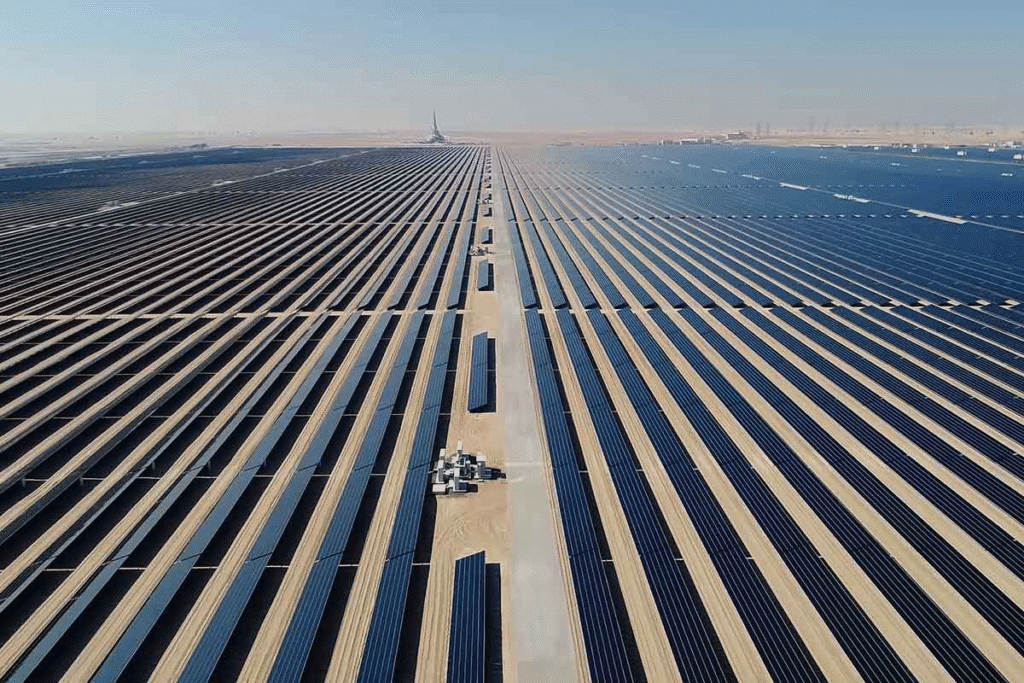UAE-based Global South Utilities (GSU) has become a key partner in a consortium set to develop an integrated solar industrial complex in Egypt. This collaboration, valued at US$220 million (AED808 million), marks a major investment in Egypt’s renewable energy sector and demonstrates the UAE’s commitment to supporting clean energy initiatives in the region.
Overview of the Solar Project
The project, named Atom Solar Egypt, will be constructed in the Sokhna Industrial Zone, part of the Suez Canal Economic Zone. Spanning over 200,000 square meters, the facility will have an annual production capacity of 2 gigawatts (GW) for solar cells and 2 GW for solar panels. It will also include a 1 gigawatt-hour (GWh) energy storage system, enhancing Egypt’s ability to store and utilize solar energy efficiently.
The solar industrial complex will combine advanced manufacturing technology with local resources to create a world-class renewable energy facility. The project is expected to strengthen Egypt’s position in the global solar energy market while supporting the country’s domestic energy needs.

Strategic Partnerships Behind the Project

The consortium developing Atom Solar Egypt includes:
- Global South Utilities (GSU): A UAE-based renewable energy investment company.
- JA Solar: A leading Chinese solar manufacturer providing technical expertise.
- AH Industrial Management: An Egyptian company offering local management experience and insights.
- Infinity Capital: A Bahraini investment firm providing financial support.
This collaboration leverages the strengths of each partner, combining financial investment, technical expertise, and local knowledge to ensure the project’s success.

Economic and Employment Impact
The Atom Solar Egypt facility is expected to create over 800 direct jobs during both construction and operation. Employment opportunities will span manufacturing, engineering, and administrative roles, providing a significant boost to the local workforce.
Additionally, the project will stimulate Egypt’s industrial sector by using locally sourced raw materials, including aluminum and glass. This approach not only supports economic growth but also fosters technological advancement within the country.
Technological and Environmental Benefits
From a technological perspective, the facility will adopt advanced manufacturing processes to produce high-efficiency solar cells and panels. The integrated 1 GWh energy storage system will ensure a reliable and stable solar power supply, addressing common intermittency issues in renewable energy systems.
The project aligns with Egypt’s Vision 2030, which aims to increase the share of renewable energy in the national energy mix and reduce dependence on fossil fuels. By investing in renewable energy infrastructure, the country is taking meaningful steps toward a sustainable and resilient energy future.
Environmentally, the development will contribute to reducing carbon emissions and mitigating climate change. The large-scale solar production facility represents a strategic move toward cleaner energy generation and reinforces Egypt’s commitment to environmental sustainability.
Regional Cooperation and Strategic Significance
The Atom Solar Egypt project exemplifies the potential of regional cooperation in advancing renewable energy initiatives. The partnership between the UAE, China, Bahrain, and Egypt highlights the importance of cross-border collaboration in addressing energy challenges.
Such alliances enable the sharing of knowledge, technology, and resources, fostering innovation and accelerating the adoption of clean energy solutions across the Middle East and North Africa region. The project is also likely to inspire similar collaborations in other countries looking to expand their renewable energy capabilities.
Contribution to Egypt’s Energy Goals

The Atom Solar Egypt project supports Egypt’s broader renewable energy objectives, contributing to increased solar capacity and energy security. It complements other notable initiatives, such as the Benban Solar Park, one of the largest solar installations globally, which underscores Egypt’s leadership in renewable energy in Africa and the MENA region.
By expanding solar manufacturing and energy storage capabilities, the project helps Egypt move closer to achieving its renewable energy targets while positioning the country as a hub for solar technology innovation.
Conclusion
The involvement of UAE-based Global South Utilities in the Atom Solar Egypt project reinforces the UAE’s leadership in promoting renewable energy development in the region. The $220 million investment in a solar industrial complex in the Sokhna Industrial Zone will generate employment, boost industrial growth, and advance Egypt’s renewable energy capacity.
This initiative demonstrates how international partnerships can drive large-scale renewable energy projects, create economic opportunities, and promote environmental sustainability. As Atom Solar Egypt progresses, it is poised to serve as a model for similar initiatives across the region, showcasing the benefits of collaboration in building a greener and more sustainable future.
By investing in high-efficiency solar cell and panel production, along with energy storage technology, Egypt is establishing itself as a key player in the renewable energy sector, paving the way for a cleaner and more resilient energy landscape.
Do follow UAE Stories on Instagram
Read Next – Dubai Police and Dubai Municipality Sign SLA to Enhance Public Safety














